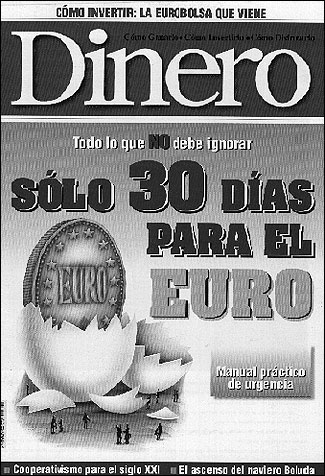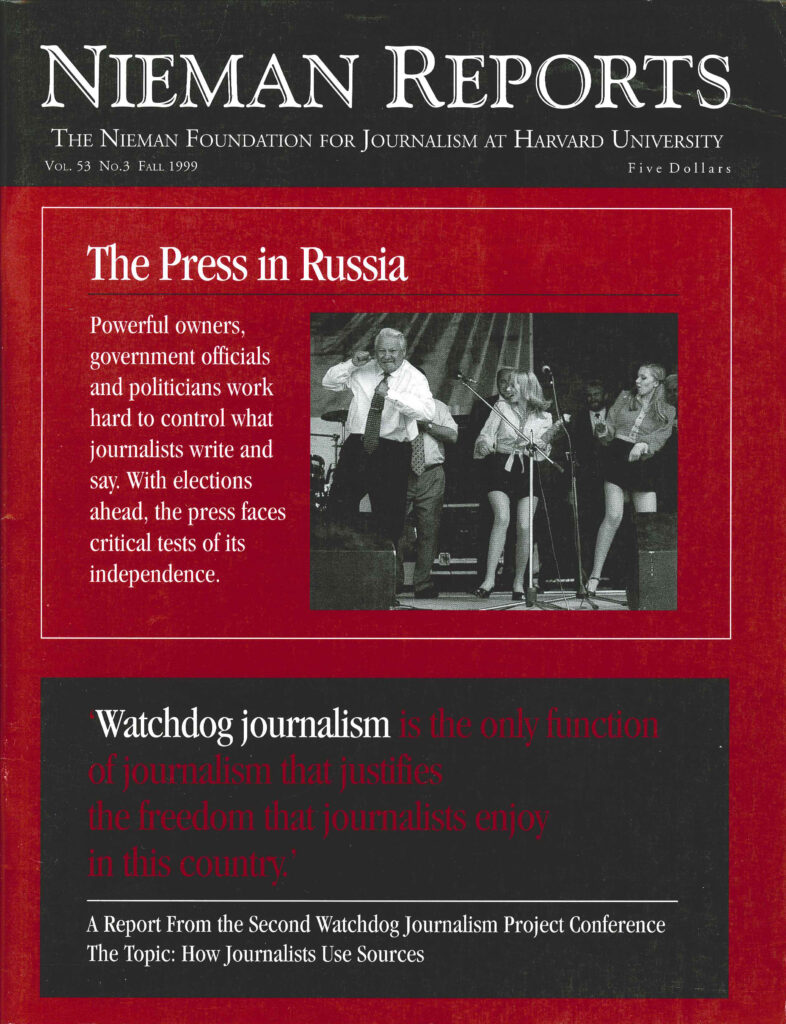
This headline reminds Spaniards there are only 30 days until the euro arrives and offers them “everything you have to know,” including an emergency guide.
From the starry eyes and excited tones of these Spanish journalists, you know they are talking about much more than a new coin:
“It symbolizes democracy and modernity,” gushes a business writer with Colpisa, Spain’s national news agency.
“It anchors Spain to Europe,” chimes another journalist.
“It means we’ve caught the train of history,” declares Mariano Guindel, a business editor and columnist at La Vanguardia, one of Spain’s leading newspapers. “We have the opportunity to end the century in the rich folks’ club, to belong to the group in charge.”
The object of their praise is the euro, the new single European currency, which went into effect on January 1 for stock trades, bank loans, credit card transactions, and all other non-cash currency exchanges in 11 EDITOR'S NOTE:
The 11 countries are Austria, Belgium, Finland, France, Germany, Holland, Ireland, Italy, Luxembourg, Portugal and Spain.countries. Euro notes won’t begin to circulate until 2002.
This fledgling currency isn’t accustomed to such royal journalistic treatment. Over the years, the prospect of monetary union has sparked considerable controversy in the western European press, from “Say No” campaigns in England to periodic bouts in Germany of Deutschmark-separation anxiety. But in Spain, there has been no public debate, no threats of a referendum, not even a squabble for influence in the newly created European Central Bank. A combination of factors—including unanimous support by conservative and socialist parties—have pushed the issue of monetary union far from the sphere of cost-benefit analysis and into the fuzzier realm of status symbol and national pride.
While the media in other countries have grappled with issues such as the loss of national sovereignty—for example, political leaders in “Euroland” can no longer devalue their currencies or play with interest rates to quick-fix national economies—members of the Spanish press have breathlessly told a pretty tale. Spain, the poor underdog, triumphs against the odds to fix its economy and, in the end, gets to join the euro club. The cost of that economic makeover, involving rapid privatization of almost every industry, doesn’t fit into this version of the story.
“Spain comes out in front,” boasts the headline of an article published January 1 by the national newspaper chain El Correo. “Against wind and tide, the euro zone sets sail, and for the first time, Spain is among the 11 countries that begin this unprecedented adventure.”
Why is the euro so important to Spain, or at least to its media and the rest of its intellectual elite? The main reason, any journalist, academic or even the local bartender will tell you, is that Spain has an inferiority complex. This is a century-long inferiority complex that goes back to 1898, when Spain lost its last colonies and gained a national identity crisis (along with its better-known generation of great writers). The hand-wringing got so bad that philosopher Ortega y Gassett, foreshadowing today’s “euro-phoria,” is known to have declared: “Spain is the problem, Europe is the solution.”
And Spain did have problems, the most memorable of which, it seems, was its bad image. In the words of veteran journalist Jose Antonio Martínez Solar: “Spain was seen by the rest of Europe as a Third World country filled with a bunch of poor superstitious farmers, not even real Christians, who spent all day playing the guitar.” Northern sophisticates dismissed their southern neighbors with five words: “Africa starts in the Pyrenees.” The phrase, Martínez says, still stings.
It is no surprise, then, that Diario 16, the magazine Martínez founded and the first independent journalistic attempt of the post-Franco era, debuted with a cartoon of King Juan Carlos saying “Europe, yes!” If anything could aggravate an already low national self-esteem, it was 40 years of dictatorship under Franco. Here was the rest of the continent, rebuilding its economy and enjoying its liberty after World War II, and what was Spain doing? It was strapped to a dictator, getting religion and conservatism forced down its throat, and wallowing in the same poverty it had suffered since the Spanish Civil War. “Isolated” and “abandoned by the rest of Europe” are the phrases many use to describe the feeling during that period.
Like the baby boomers in America, the movers and shakers in today’s Spain belong to the generation that remembers when you had to travel to France to buy censored books. They looked north for models to write their constitution, design their newspapers, and ignite their economy. For this generation, Europe symbolized what Spain did not have under Franco: freedom of expression, prosperity, democracy and socialism. And now the euro, the latest badge of an idealized Europe, symbolizes all this as well.
But in regions such as the Basque Country and Catalunya, the euro has extra meaning: independence from Spain. What we now know as Spain, you see, is really a conglomeration of several “countries,” held together by 500 years of centralized, Castilian control. Over the centuries, Spain’s centralized government would often repress the regional cultures, prohibiting the speaking of local languages.
Now, enjoying the freedom of Spain’s young democracy, these so-called “nationalist” regions take great pains to assert their non-Spanish identity, even struggling to break away altogether from the state, in the case of the Basque Country. The peseta, here, is just one more reminder of Spanish domination. The euro, on the other hand, is unblemished and a sign that these regional economies are tied not to Spain, but to the protective umbrella of Europe.
And so, from Barcelona to La Coruña to Seville, Spanish newspapers churn out bank- and government-financed special supplements celebrating the euro, the more pages the better. They print colorful inserts on special themes, such as “how to get your business ready for the euro.” They design cute graphics showing the price of a meal at McDonald’s (3.56 euros) and the cost of a color TV (966 euros). They add agony columns to business sections so that banking experts can assuage the fears of ordinary readers who ask down-homey questions like, “Will the euro make prices rise?” And they give the best play to articles with feel-good headlines, such as “The euro: panacea for the euro-jobless,” and “The euro breaks the dollar’s world hegemony.” In these articles, nobody loses a job; businesses just become “more competitive.”
For every dozen or so such articles, one appears with a critical voice, quoting one of Spain’s few so-called “euro-skeptics.” This is a derogatory term, and ordinary journalists do not want it applied to them. Even though perfectly solid democracies like England and Sweden have rejected the euro for the time being, in Spain such a position is unacceptable. To show skepticism in Spain is therefore regarded as “undemocratic.”
“Coming out with an article highly critical of the euro is like, in the United States, coming out in favor of socialized heath care and high taxes,” says the business writer Ramón Muñoz of the national daily El Mundo. “If you say something, your colleagues dismiss you with a condescending smile, like you’re weird. No one wants to go against the current.”
Don’t ask what happens if the economic current shifts, the economy takes a dive, and the euro has to swim upstream. The usual answer: “Only an American would think of such a question.”
Dale Fuchs went to Spain in September on a Fulbright Fellowship for journalists to study how the Spanish press covers the euro, and she is now writing features for a Spanish daily, El Mundo. In the United States, she covered politics and education and wrote features for a Florida daily, The Palm Beach Post.



